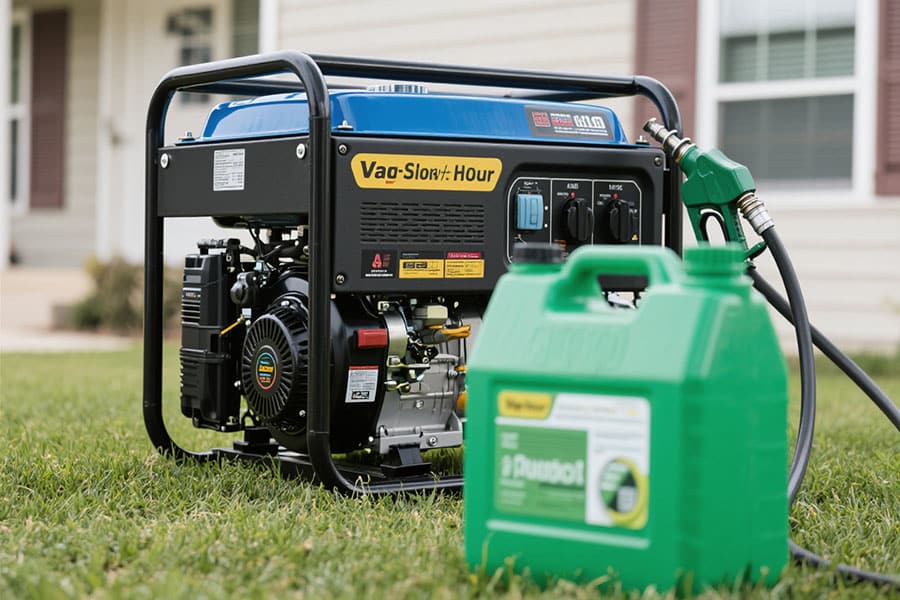Running out of generator fuel unexpectedly? This frustration can halt operations and cause significant stress. Understanding your generator’s fuel consumption is key to avoiding this common problem.
A generator’s hourly gas consumption varies widely, but a common 3000-watt generator might use around 0.4 to 0.5 gallons per hour at rated load. The exact amount depends on its size (watts), load, engine efficiency, and fuel type.
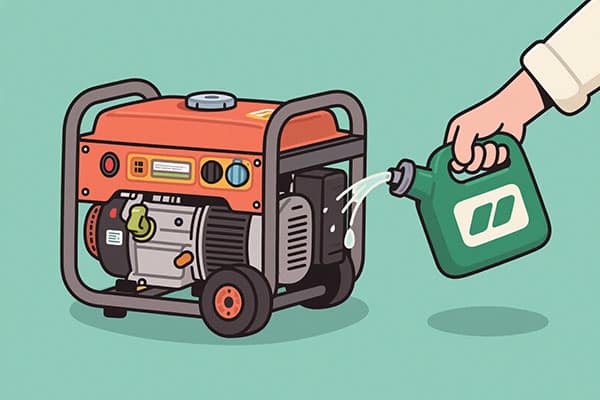
Here you will know how it comes:
Generator fuel consumption can be scientifically quantified using the following universal formula:
Hourly Fuel Consumption (L/h) = [Rated Power (KW) × Specific Fuel Consumption (g/kWh)1] ÷ Fuel Density (g/L)
Illustrative Calculation for a 3kW Generator:
- Generator Rating: 3 kW
- Specific Fuel Consumption: 395 g/kWh
- Gasoline Density at Room Temperature: 720 g/L
Mathematical Derivation:
3 × 395 ÷ 720 ≈ 1.69 L/h (rounded to 1.7 L/h under full load)
Critical Considerations:- Fuel Specification
Density varies significantly with formulation (summer/winter blends: 715–780 g/L) and temperature (≈0.65% density decrease per 1°C rise) - Efficiency Variables
Engine condition, altitude, and ambient temperature alter real-world consumption by 8–15% up.
- Fuel Specification
Understanding fuel usage isn’t just about avoiding an empty tank; it’s about efficient planning and cost management, especially when you rely on generator power for critical tasks. I’ve learned this firsthand over my years in the generator business. Let’s explore how to get a clearer picture of your generator’s thirst for fuel so you can plan better and keep things running smoothly.
How long will a generator run on 5 gallons of gas?
Worried your 5-gallon(18L) fuel supply won’t last? Guessing game with fuel can lead to sudden power loss. With a little knowledge, you can reliably estimate its runtime.
A generator running on 5 gallons of gas can last anywhere from 8 to 12 hours. This depends heavily on the generator’s wattage and the load it’s powering. A smaller generator at low load will run much longer.
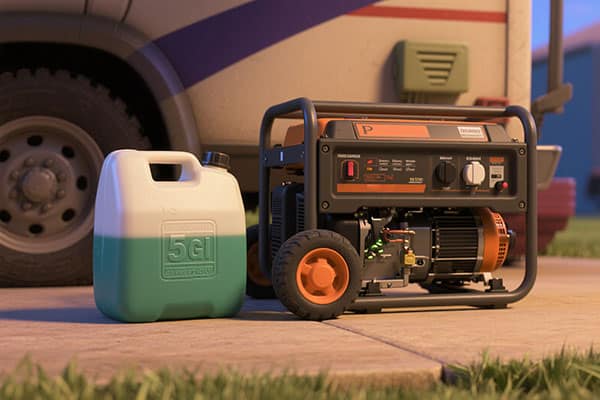
To figure this out more accurately for your specific situation, we need to look at a few things. The main idea is simple: Runtime equals the amount of fuel you have divided by how fast the generator uses it.
So, Runtime (hours) = Fuel Tank Size (gallons) / Hourly Fuel Consumption (gallons/hour).
The tricky part is the "Hourly Fuel Consumption." This isn’t a fixed number. It changes based on:
- Generator Size (Wattage): Bigger generators usually use more fuel.
- Load: The amount of power you’re drawing. A generator powering a few lights will use less fuel per hour than one running an air conditioner and a refrigerator.
Let’s consider an example. I often tell my clients that a typical 3000-watt generator might use about 0.45 gallons per hour at rated power load.
So, with 5 gallons: 5 gallons / 0.45 gallons/hour ≈ 11.1 hours.
If that same generator is running at a higher load, the consumption might go up to 0.6-0.7 gallons per hour, and your 5 gallons would last closer to 7-8 hours.
Here’s a rough idea for different scenarios:
Estimated Runtime on 5 Gallons of Gas (at Rated Load)
| Generator Size (Watts) | Approx. Consumption (Gal/h) | Estimated Runtime (hours) |
|---|---|---|
| 2000W (Inverter) | 0.20 – 0.25 | 20 – 25 |
| 3500W | 0.40 – 0.50 | 10 – 12.5 |
| 5000W | 0.60 – 0.75 | 6.5 – 8 |
Remember, these are estimates. As I mentioned in my insights, factors like engine condition, the specific formulation of gasoline (summer vs. winter blends), and even ambient temperature can nudge actual consumption up by 8-15%. An older, less maintained generator will be thirstier.
How long will 10 gallons of gas run a generator?
Planning for extended power needs with 10 gallons of gas? Miscalculating can leave you in the dark. Let’s ensure your generator can go the distance you expect.
With 10 gallons of gas, a generator could run from 15 hours up to 40 hours or more. The exact duration depends on the generator’s power output (wattage) and the electrical load it’s supporting. Higher efficiency units or lower loads extend runtime.
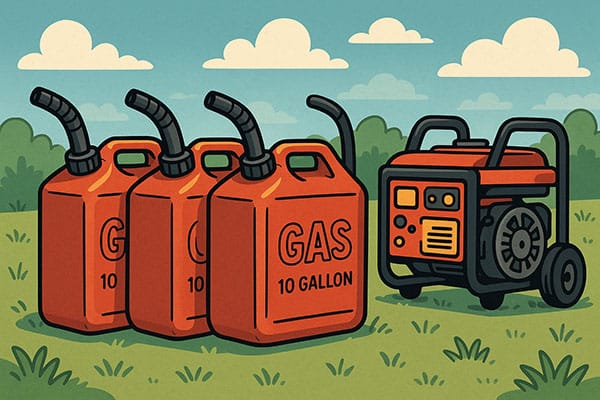
Having 10 gallons of fuel gives you a much longer buffer, which is great for more serious Power Outages or longer projects. The calculation principle is the same: divide your fuel volume by the consumption rate.
Runtime (hours) = 10 gallons / Hourly Fuel Consumption (gallons/hour).
When I work with purchasing managers, we often discuss how different generator technologies impact efficiency. For example, inverter generators are generally more fuel-efficient than gasoline generators, especially at lower loads. This is because inverter generators can adjust their engine speed to match the load, while conventional ones often run at a constant speed. This difference can really add up with 10 gallons of fuel.
Let’s look at how this plays out:
Estimated Runtime on 10 Gallons of Gas (at rated Load)
| Generator Size (Watts) | Approx. Consumption (Gal/h) | Estimated Runtime (hours) |
|---|---|---|
| 2000W (Inverter) | 0.20 – 0.25 | 40 – 50 |
| 3500W | 0.40 – 0.50 | 20 – 25 |
| 5000W | 0.60 – 0.75 | 13 – 16.5 |
| 7500W | 0.75 – 1.00 | 10 – 13 |
One critical point from my experience: fuel itself matters. The density of gasoline can vary. Summer-grade gasoline has a different density than winter-grade gasoline. Temperature also affects density – for every 1°C rise in temperature, gasoline density decreases by about 0.65%. This might seem small, but it means the actual energy content in your 10 gallons can vary slightly, impacting total runtime. I’ve seen clients surprised when their generator runs a bit shorter in very hot weather with the same amount of fuel they used in cooler conditions. Keeping your fuel fresh and stored correctly also helps maintain its quality for optimal consumption.
How long will a 7500 watt generator run on a tank of gas?
Got a powerful 7500-watt generator and wondering about its fuel endurance? Running out with a big unit is a major headache. Understanding its specific fuel needs is crucial for uninterrupted power.
A 7500-watt generator typically runs for 6 to 12 hours on a full tank of gas, depending on its tank size (usually 6-7 gallons) and the load.
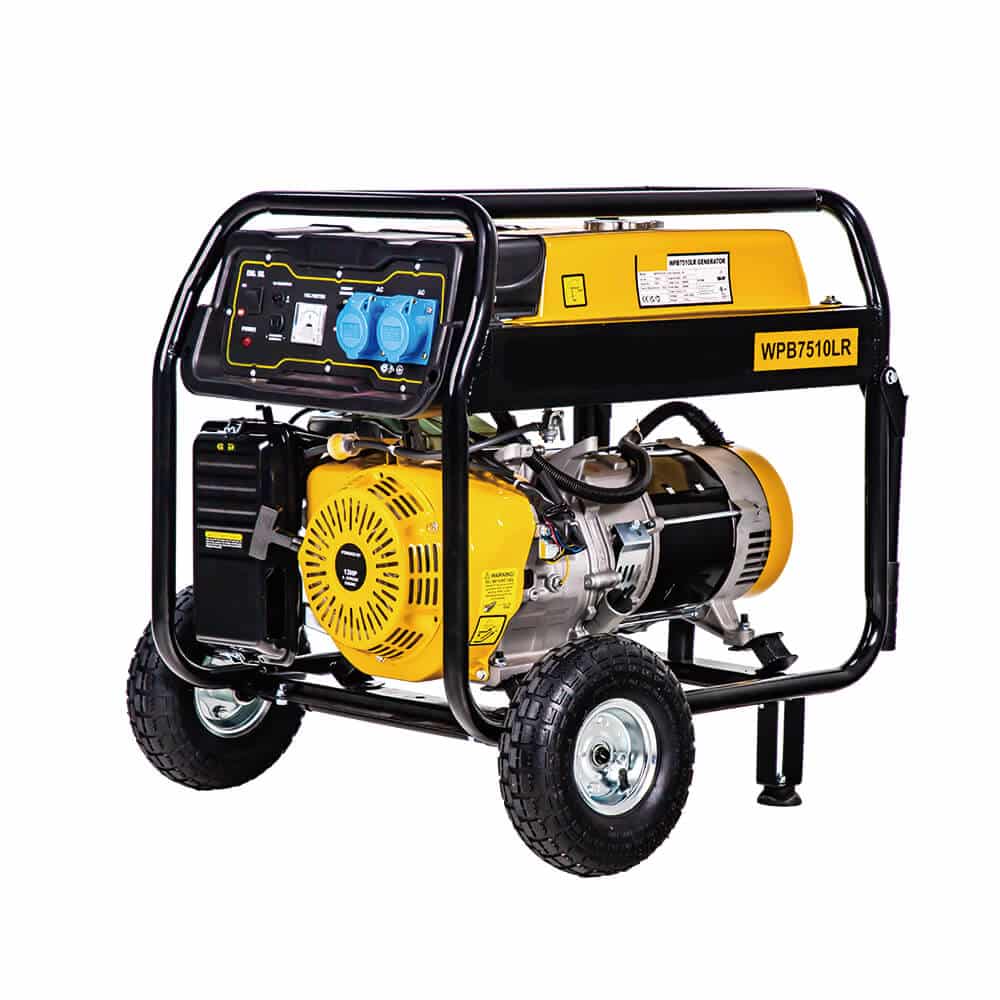
A 7500-watt generator is a pretty hefty machine, capable of powering multiple appliances and even central AC in some homes. Because of their power, they naturally consume more fuel. Most generators of this size come with a fuel tank ranging from 6 to 7 gallons, with 6 gallons being quite common.
To get specific, let’s use the formula I shared:
Hourly Fuel Consumption (L/h) = [Rated Power (KW) × Specific Fuel Consumption (g/kWh)] ÷ Fuel Density (g/L).
For a 7.5kW (7500W) generator, assuming a Specific Fuel Consumption (SFC) of around 395 g/kWh (a common value I’ve seen, though it varies by model and design) and gasoline density of 720 g/L:
Consumption = (7.5 kW × 395 g/kWh) / 720 g/L ≈ 4.11 L/h.
Converting to gallons: 4.11 L/h ÷ 3.785 L/gallon ≈ 1.09 gallons/hour. This is at full load.
However, generators rarely run at full load constantly. a 7500W generator might consume around 0.75 to 0.85 gallons per hour.
Let’s assume a common tank size of 6 gallons for a 7500W generator:
Then the Estimated Runtime for a 7500W Generator with a 6-Gallon Tank will be 7hours
Don’t forget the "Critical Considerations" I always stress: engine condition, altitude, and ambient temperature can collectively increase fuel consumption by 8-15% or even more. So, if you calculate a 10-hour runtime, in reality, it might be closer to 8.5 or 9 hours. Knowing these real-world variables is key for accurate operational planning. It’s why I always recommend having a bit more fuel than you think you’ll need.
Conclusion
Understanding your generator’s gas usage involves load, size, and efficiency. Accurate estimates prevent unexpected shutdowns and help manage fuel effectively, keeping your operations powered when you need it most.
-
Exploring the impact of Specific Fuel Consumption can lead to better fuel efficiency and performance in generators. ↩

